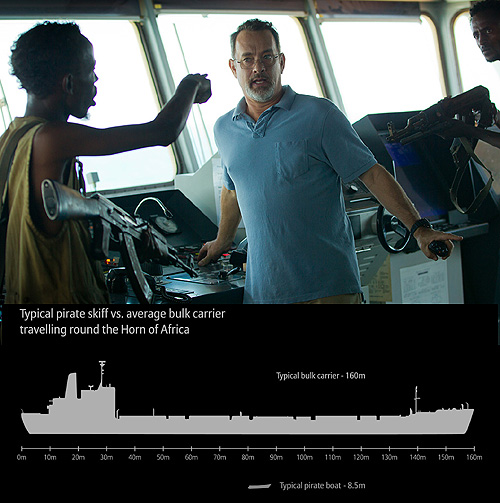 Somali piracy is at its lowest level in years and Tom Hanks helps show us why.
Somali piracy is at its lowest level in years and Tom Hanks helps show us why.
The Oscar-nominated “Captain Phillips” starring Tom Hanks depicts in terrific detail the hijacking of a giant container ship as it traveled through Somali waters in 2009. The film which has already won a screen writers award is up for six Oscar nominations.
Anyone watching the film right from the beginning is going to scream out, “Why doesn’t the crew have guns!?”
Well, most crews do now have guns. The Alabama was hijacked in 2009 when few merchant vessels from any country in the world were allowed to be armed.
That stemmed from a centuries long policy of governments worried that large vessels were capable of coups. Later in history rogue merchant vessels tried avoiding naval inspections as Britain and the U.S. started to police the high seas for contraband.
More recently the government of Egypt banned any type of armed vessel in the Suez canal, where most of the ships in Somali waters originate.
But after large naval task forces organized by the U.S. and European union were unable to stem increasing piracy by 2010 many countries including the U.S. began allowing on-board security. The U.S. remains the most restrictive, but many U.S. flag carriers can now carry weapons or commercial security.
In 2009 giant ships like the Alabama were completely unarmed. The movie details how the captain and crew had to behave without weapons. It shows how tiny little speedboats with a handful of men carrying old Uzis or AK47s could take over a ship 3 times the length of a football field, bigger than five 747s.
As a composite of the 500 ship hijackings that year, I believe the movie does a fabulous job. It may not have been so honest with regards to Capt. Phillips and the Maersk Alabama.
In fact quite to the contrary, the crew of the Alabama is suing the real Captain Phillips and his employer, Maersk, for more than $50 million for malfeasance.
“It is galling for them to see Captain Phillips set up as a hero,” the plaintiffs’ lawyer told the Guardian last October. “It is just horrendous, and they’re angry.”
The crew contends that Capt. Phillips should have done exactly what the film depicts Capt. Phillips doing! If the crew is telling the truth, it’s almost as if Columbia pictures read the litigants’ charges and wrote the screenplay from the depositions!
Water hose defense, engine room retreat, wave action, intentional power failures … all procedures the suit against Maersk contends Capt. Phillips refused to do or bungled.
The film does give one clue to Capt. Phillips’ culpability. U.S. recommendations which Maersk had adopted included keeping ships at least 300 miles and preferably 600 miles from the Somali coast. In the film the ship is about 200 miles from the coast when hijacked.
Because the litigation is current, neither Maersk or Captain Phillips will comment. At least until the Oscars are awarded, neither will Sony or Hanks.
The screenplay also dug into the reality of why there is piracy in the first place. I wish it had been developed more elaborately, but kudus to the writers for bringing up the subject of how the Somalis had been raped of their fisheries by multinational fishing companies.
Most pirates were once fishermen, or more correctly, would be fishermen if their industry hadn’t been plundered by multinationals taking advantage of the implosion of the Somali state.
In the movie there is a poignant scene where Capt. Phillips (Tom Hanks) challenges the chief pirate:
“You’re no fisherman!” Hanks charges and then asks the pirate why with his language skills and obvious other capabilities he doesn’t do something more legitimate.
“Maybe in America,” the pirate answers. “Not in Somalia.”
In 2009 when the Alabama was hijacked, there were nearly 500 hijackings annually. Last year it was about half that.
Piracy is down because of actions as depicted in the film by heroic crew, because of massive operations by European and American navies (including as masterfully shown in the film an exciting operation by Navy Seals), and probably most of all because of the pacification of Somalia itself.
Go see the flick! Hollywood finally gets it right.